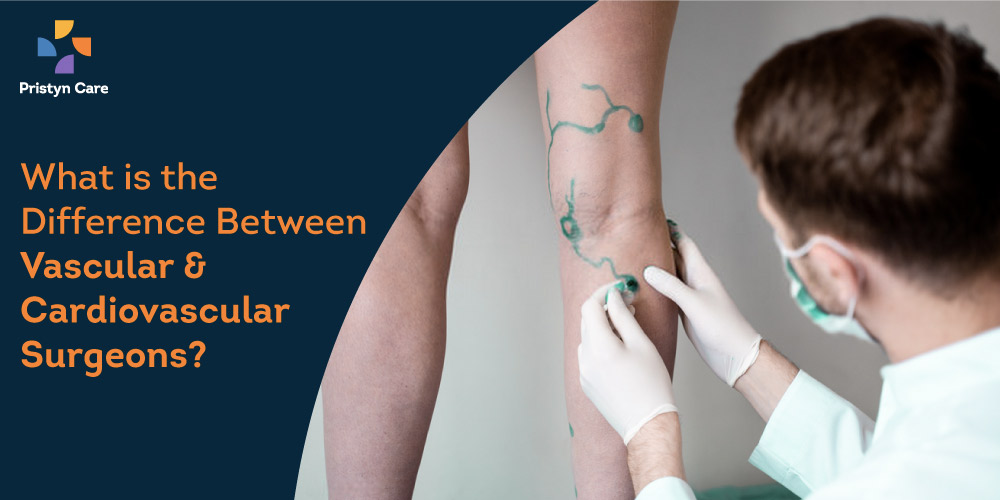
A layman usually gets confused between medical terms. Vascular surgeon and cardiovascular surgeon are two terms that are very closely related to each other. That’s why people often feel confused about which type of doctor they should seek for specific health problems.
A cardiovascular surgeon (cardiologist) and vascular surgeon are both medical experts that provide treatment for conditions related to different body parts.
Today, with this blog, you will learn the difference between a vascular surgeon and a cardiovascular surgeon in detail. You will also read about the symptoms that require timely attention to prevent vascular diseases from becoming life-threatening.
At Pristyn Care, we regularly see cases where patients delay treatment for leg pain, spider veins, varicose veins, etc. because they don’t know how problematic these common conditions can be. If you have pain in the legs that goes away when you elevate them or have other symptoms like swelling in the legs, bulging veins, etc., it is better to see a vascular surgeon. Find the exact cause and get suitable treatment from Pristyn Care experts. Book an appointment with reliable and experienced vascular surgeons and consult them for free.
Table of Contents
Role of a Vascular Surgeon
A vascular surgeon is a doctor who is certified and licensed to diagnose, treat, and manage the conditions that affect the vascular system outside the heart and brain. Vascular surgery is the subspecialty in which the practitioners provide comprehensive treatment for diseases of the vascular system, i.e., arteries, veins, and lymphatic circulation.
The responsibilities of a vascular surgeon involve-
- Assessing patients
- Performing tests such as angiographies
- Inserting shunts and stents in the patient
- Educating patients about the importance of diet and exercise
- Correcting blockage in the arteries and veins
They are specifically trained to treat conditions like peripheral vascular diseases in arteries and veins through medications, non-surgical procedures, and surgeries. Vascular surgeons also specialise in minimally invasive treatments and endovascular techniques that are replacing invasive surgical techniques all across the globe.
Role of a Cardiovascular Surgeon/ Cardiologist
A cardiologist is a doctor that deals with disorders of the heart. The cardiovascular system is the heart and its components and the treatment of any condition that affects the heart will be treated by a cardiovascular surgeon. They use medications, provide dietary advice, and other wellness recommendations that are necessary to keep the heart healthy and prevent the risk of vascular problems.
A cardiologist can get additional training to become a non-invasive cardiologist and work as an invasive non-interventional cardiologist, electrophysiologist, or interventional cardiologist. The doctor is skilled in handling the following responsibilities-
- Conducting stress tests
- Producing images of the heart
- Clearing blocked arteries
- Performing ablation of arteries or veins
When a patient goes to the cardiologists with symptoms that may indicate heart problems, the doctor orders various tests, such as angiograms, catheterization, etc. to better understand the nature and cause of the problem.
When should you see a vascular surgeon?
In India, most people don’t pay attention to their vascular health until it gets worse enough to negatively impact their life.
People are not even aware of the signs and symptoms of vascular problems that would raise suspicion in their minds about visiting a vascular specialist. Here is a list of symptoms of vascular disorders that you must know about-
- Pain or cramping in the calves, thighs, or buttocks during walking or other types of exertion that subsides when you rest.
- Pain or numbness in the toes at rest or with elevation.
- Discoloration of the skin of the legs or feet.
- Swelling in the legs or feet without any specific cause.
- Aches or fatigue that progresses from morning to evening.
- Tender or bleeding varicose veins in the legs, groin, or private areas.
- Pelvic pain, pressure, and heaviness without gynecological explanation.
- Sudden symptoms like pain, coldness, swelling, or color changes in the legs
You should understand that “bad” is a relative term and the definition of bad for you may be different from the doctors. Many people downplay their symptoms and put on a strong front without any specific reasons. But leaving the symptoms unattended can cause the problem to progress and critical symptoms may appear.
Get Proper Treatment for Vascular Diseases From Expert Vascular Surgeons
Many people avoid seeking treatment for vascular conditions believing that they might have to undergo surgery. But thanks to technological advancements, vascular problems can be treated through minimally invasive procedures.
At Pristyn Care, we have a dedicated team of vascular surgeons and interventional radiologists who excel in leveraging the modern technique to manage and treat vascular disorders.
You can get in touch with the experts and find out the type and severity of the disease. The doctor will recommend the right course of treatment for the specific condition and explain what it entails. After getting all the necessary information, it is up to you to make the final decision and resolve the symptoms.
If you visit a vascular surgeon but have symptoms that are related to your heart, the doctor will also refer you to a cardiologist for proper treatment.







